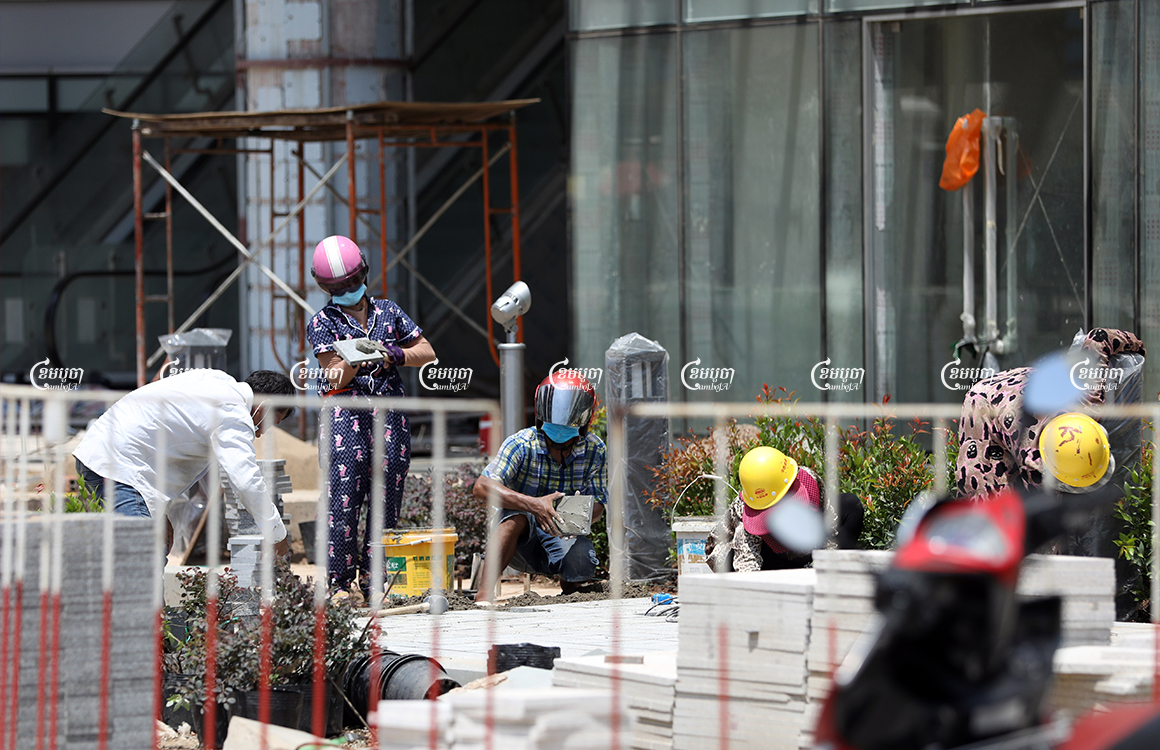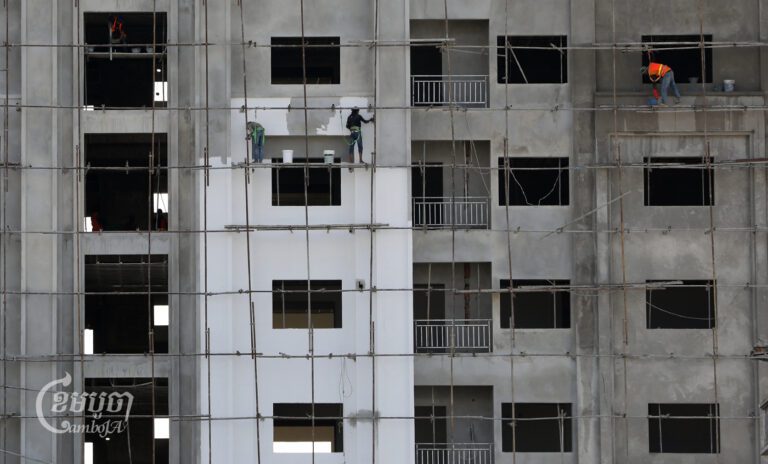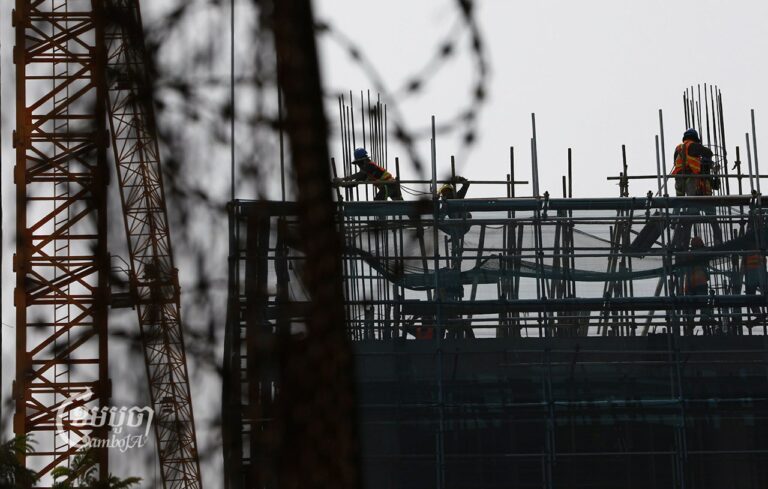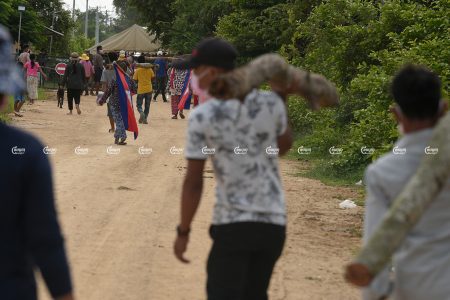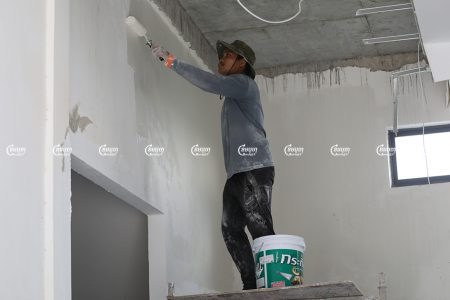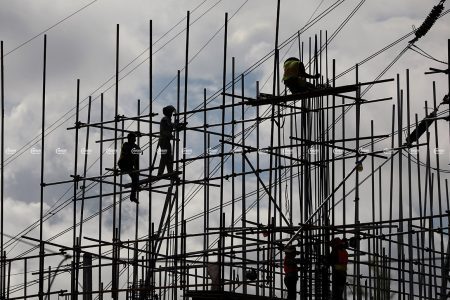Freed from lockdown, construction workers in Phnom Penh are still struggling to support their families as they complain of less work for lower wages.
Roeut Chamrong, a 34-year-old foreman, had been working for a private construction company in Meanchey district’s Stung Meanchey III commune when the area was designated a red zone by authorities. He said that between April 14 and May 4, he had received no income at all.
“It had a big impact, because we couldn’t earn income due to being stuck at one site,” he said. He added that construction workers get paid on a day-to-day basis — if there was no work, there was no money.
“I was a foreman,” he said. “That means I could earn $20 per day, so during the 20-day lockdown I had nothing.”
On May 5, the government lifted citywide lockdowns of Phnom Penh and Takhmao City but continued smaller targeted lockdowns for areas with high rates of COVID-19 infections. Those living in these designated red zones are still not allowed to leave their homes. But despite the loosening restrictions, workers in the nation’s construction sector are still struggling to get back on their feet.
Now, Chamrong said, he has been working at a new construction site for about six days so far since authorities narrowed the city’s red zones. Despite his newfound freedom, he is struggling to earn a decent living.
“At the new construction site, I can earn about $15 per day, because the building owner said that there is a burden on the economy and there is no job to do,” he said. Despite this, he is still grateful for any chance to earn a wage, having seven family members largely depending on his daily income.
“So, I have to do this job,” he said. “If I reject it, I won’t have any work to do.”
On May 12, Phnom Penh authorities issued an updated map designating most of the city as yellow zones that are safe to fully reopen. But some parts of Tuol Kork, Meanchey, Russei Keo, and Pur Senchey districts are still marked as red zones and face strict lockdown measures until May 19. Some red zones have been under lockdown since April 9.
Chamrong said that authorities provided a one-time package containing some rice and food while he was stuck in the red zone, but that there had been no financial assistance. The rest of his daily expenses were supported by family in Pursat province.
Lorn Savuth, 37, told CamboJA he had been earning about $400 a month as a construction worker before the lockdown. Now, despite having started a new job at a new construction site, he was still earning less than before.
“The big challenge is that I have to pay the bank $250 per month, and I already borrowed money [from a private lender] to pay back the bank during lockdown,” he said. He said that he had earned nothing during a 20-day lockdown in Phnom Penh’s Chroy Changvar district.
Keo Sokhem, 34, works as a floor-layer at Borei Chaktomok city, across the Mekong river in Khsach Kandal district’s Svay Chrom commune near Koh Pich. During the lockdown, the ferry crossing from Phnom Penh to Areyksatr was closed, and engineers temporarily suspended from work.
Ms. Sokhem said that she and husband were earning between $400 and $500 a month before lockdown.
“Now, my husband and I can earn about $250 — that is not enough to eat,” she said.
“It’s a hardship because I have to feed two children and my parents in the provinces. If COVID-19 is prolonged, I will move back to my province.”
Sokhem started construction work in 2017 in Kampong Thom province before moving to work in Phnom Penh about three years ago.
She appealed for help from the site owners, and asked the government to pay the same attention to construction workers that they had to garment and textile workers, many of whom received a stipend while their work was suspended due to COVID-19. In particular, she called on the government to provide construction workers with cards granting access to the National Social Security Fund.
“The government provided some assistance to garment workers, but construction workers, we have received nothing,” she said. “When we get sick, there is no money to receive treatment.”
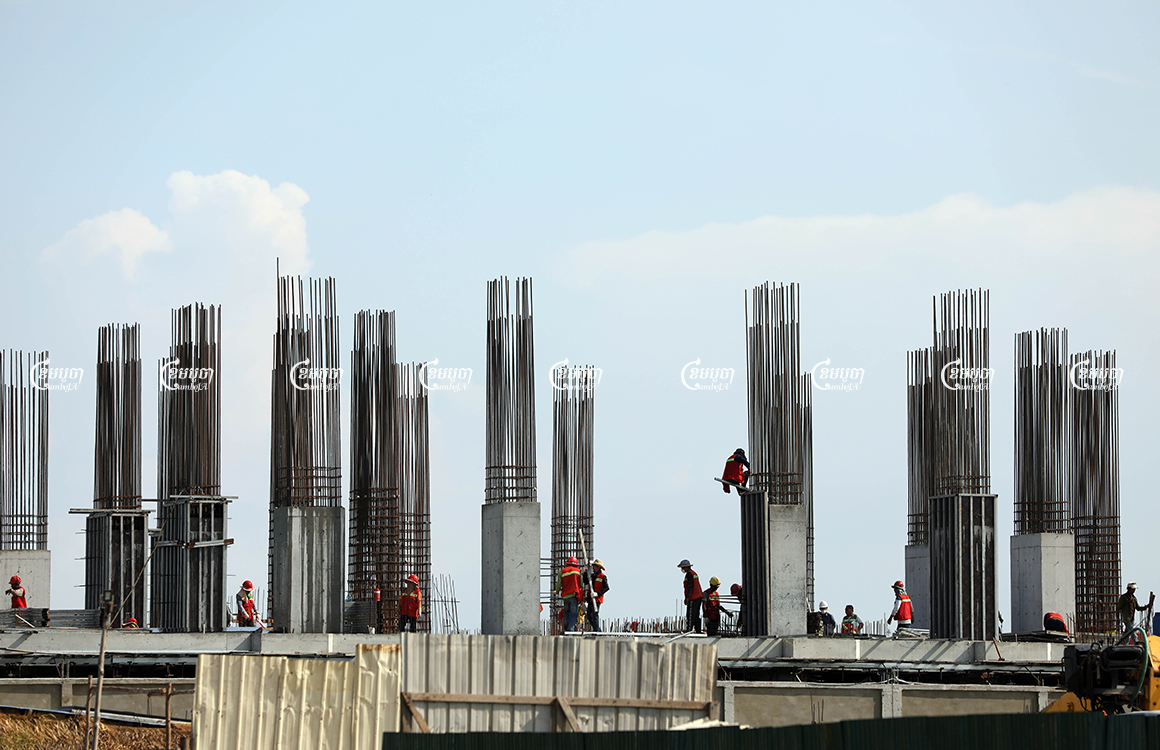
Ministry of Land Management spokesman Seng Loth said that he hadn’t heard of construction workers having their work suspended, declining to comment further.
“Where did you get this information? Because I saw many construction sites are still operating,” he said. “I drive my car and see construction sites are still operating.”
Loth said that there were about 200,000 labourers working at construction sites every day as of 2020, adding that he had not yet calculated the impact of COVID-19 on the sector. Chhay Rithiesen, director general of the Land Management, could not be reached for comment, nor could Labor Ministry spokesman Heng Sour.
Phnom Penh City Hall spokesman Met Measpheakdey said that everyone was feeling the impact of the pandemic.
“Authorities have been facilitating all people’s livelihoods, not just construction workers — especially people in red zones,” he said.
He added that construct workers belonging to the poorest families were already covered under the government’s direct payment policy made in response to the outbreak of COVID-19 early last year.
Sok Kin, president of the Building and Wood Workers Trade Union Federation of Cambodia (BWTUC), said that between 60 and 70 percent of construction workers had had their jobs suspended due to the impact of COVID-19. He added that the figure was based on the 10,000-strong BWTUC membership across Phnom Penh, Siem Reap, Kampot, Preah Sihanouk and other provinces.
“They are now facing job suspensions without salaries,” he said. “It’s especially hard because construction workers do not have benefits or seniority indemnity payments like garment workers.”
Kin said that he had submitted a request to the government to consider providing a stipend to construction workers in order to support their livelihoods during COVID-19.
In addition, his union has also requested the Ministry of Labor to provide benefits such as access to the social security fund to informal workers including construction workers, he said.
“We have noticed that when they have had jobs suspended and got sick, they have been forced to sell off their property such as cows or buffalos to receive medical treatment because they do not have a social security fund card,” Kin said.
But government spokesman Phay Siphan maintained that construction workers had not been hit so hard by the pandemic.
“Most construction workers are from provinces [and work in Phnom Penh] after harvesting rice, and they can return back during the time to plant paddy rice, so it does not impact their livelihood,” he said.
Siphan said that many construction workers remained informal workers who had not registered with the Labor Ministry. He urged them to contact their local authorities in order to receive government benefits.
For many workers who have seen their wages drop and their work dry up, it may not be enough. BWTUC president Kin said that some employers were taking advantage of the pandemic and exploiting workers by reducing wages due to the large number of people looking for work. Unlike in the garment sector, there is no minimum wage for construction workers.
“We are still worried about their livelihoods, and the shrinking job market,” he said.


